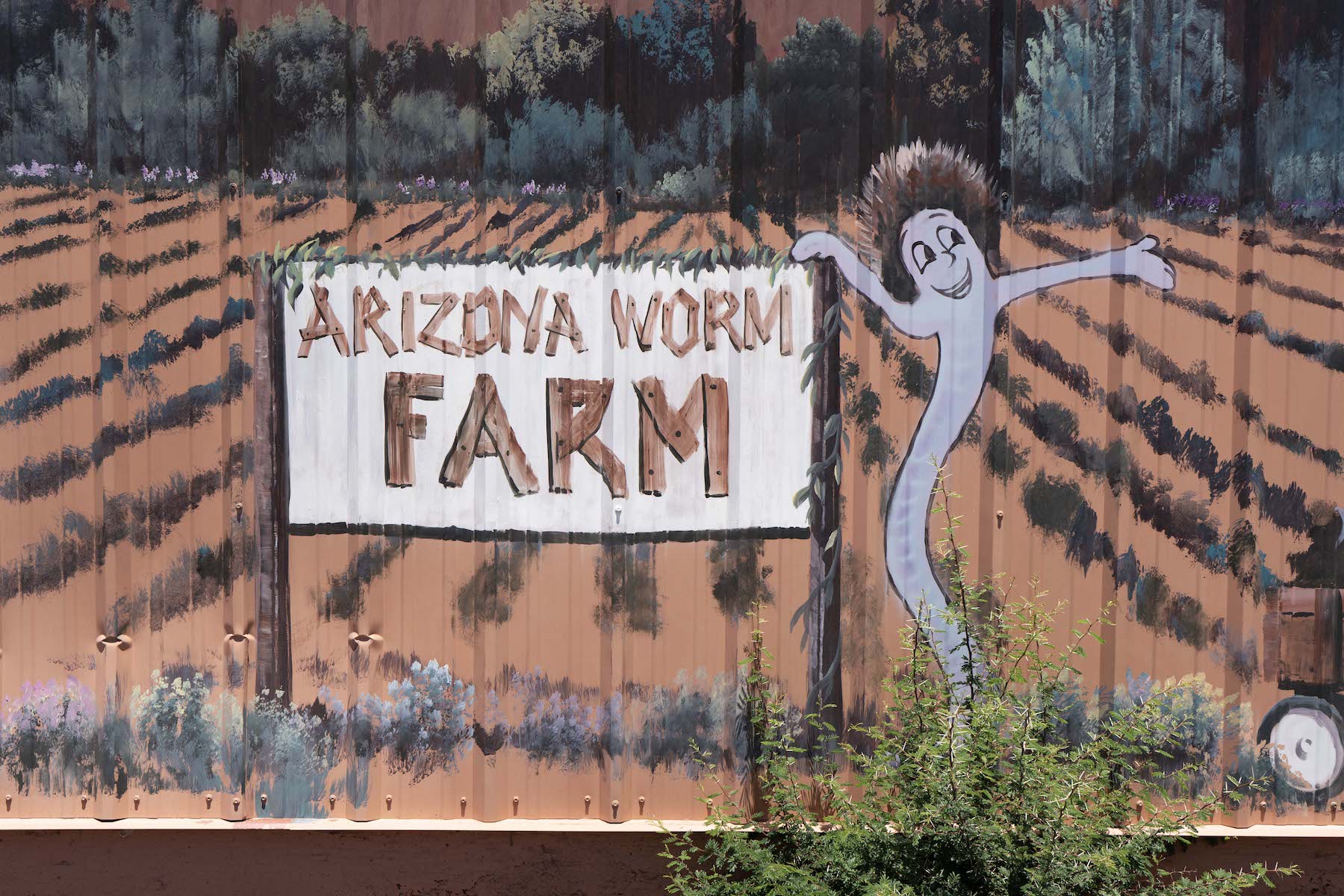Three million red wiggler worms are wiggling away at work on the Arizona Worm Farm in South Phoenix — feasting on 300 cubic yards of waste a week, turning it into fertilized soil and helping to complete a waste-to-nutrient cycle that benefits produce gardens and their tenders. This is the process of vermicomposting — feeding scraps to worms and turning it into available food for plants.
For owner Zach Brooks and his family, the worms contribute to their goal of becoming a completely self-sustaining, off-grid farm that supports them and others who want healthier soil and produce in their gardens. Currently, the Arizona Worm Farm (one of the largest worm farms in the U.S.) raises and breeds about 100,000 worms a week to help with processes on the farm itself, and to be sold to customers who utilize worms in their gardens at home.
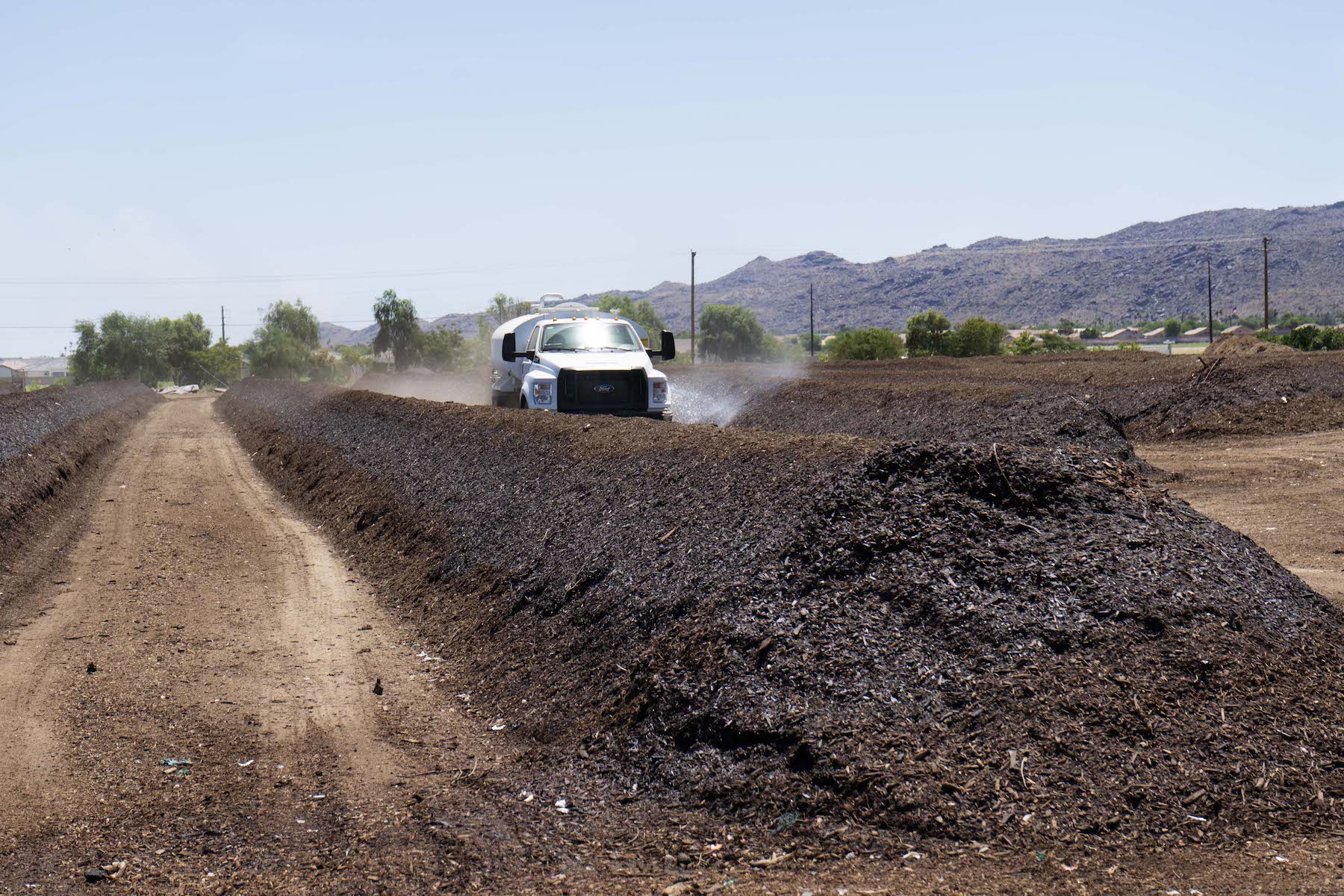
Farming wasn’t on Brooks’ radar until he returned to Arizona State University for a masters degree in sustainability in 2010, after he semi-retired from a successful career in management. The program didn’t satisfy him though, as he realized people talked about solutions, but they were only theorized and hypothetical. In December 2016, Brooks bought 10 acres of land in South Phoenix that originally produced cotton.
In 2018, he waited for the final cotton crop to be harvested and obtained the necessary permits to start his worm farm. Brooks and his family learned how to vermicompost and run the farm through the vermiculture program at North Carolina State University. As additional research, Brooks visited just over a dozen worm farms in the U.S., Europe, and Australia. From there, the family developed their own plan with the help of entomologists who helped them determine the best way to grow worms in our climate. Brooks explains that a safe temperature for the worms is between 30 degrees to 90 degrees, and the ground in which the worms reside is insulated from the 110 degree-plus days because it stays below our nighttime temperatures.
THE WORLD OF WORMS
Red wiggler worms provide a natural, chemical-free way to break down waste and fertilize soil. They help yield higher productivity, decrease plant disease, and lower pest incidents. Worms won’t eat healthy living plants or roots — they really only want the decaying organic material. They’re also self-limiting creatures, so there’s no need to worry about worms overpopulating the garden. The worms also help create soil amendments known as vermicomposting, worm castings, and worm compost tea. These are natural products that commercial fertilizers can’t compare to, and they’re easier to maintain, Brooks said.
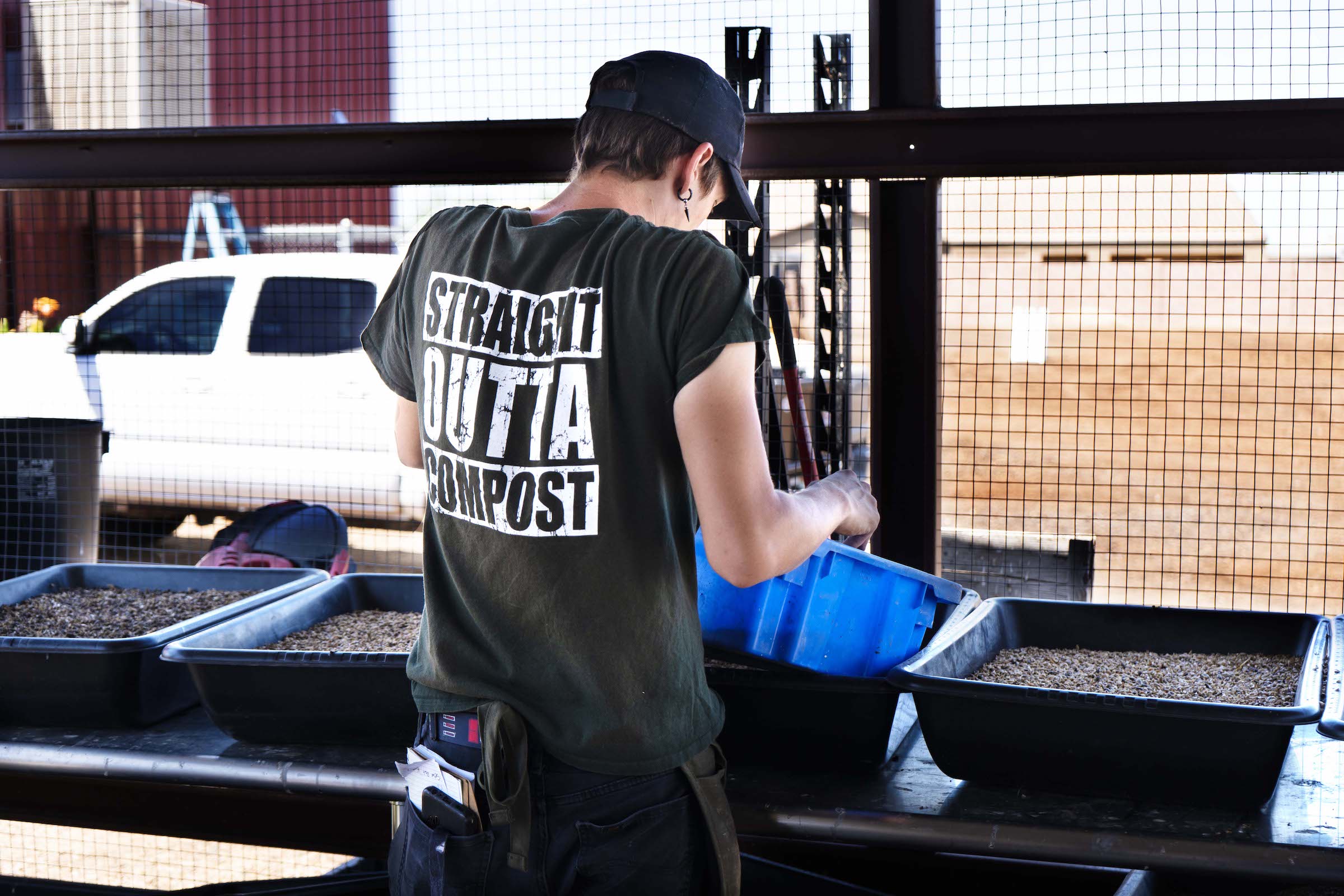
The farm employs a waste-to-nutrient circular process, in which food and landscape waste comes from local partners, which is then fed to the worms. The worms and larvae feast on the waste and turn it into high-protein feed and fertilizer. Organic worm castings repel pests, help plants grow, and absorb nutrients under challenging conditions. They provide healthy bacteria that enriches soil to create a more sustainable fertilizer. The farm produces these castings in “wedges,” where nearly 10,000 worms are fed a weekly dose of between one and two inches of compost. The worms feed on the compost and eat through the wedge to leave behind castings, which are then harvested and boxed fresh every day for customers.
Adding worm compost tea to garden soil promotes plant strength, treats mild deficiencies, fights pests, inhibits disease, and reduces plant shock. The farm combines fresh castings, compost, humic acid, kelp meal, and their own BSFL Nutrient Plus to create the tea. It’s suspended in pure well water and air is pumped into it for 24 hours, which allows microbes to reproduce quickly. The tea is for sale at the farm on Fridays and Saturdays only, although a seasonal mobile tea spray service is also offered.
Without worms, food waste that is buried in the ground produces methane gas, plus, all of the resources that went into creating that food goes to waste if it’s not reused. Worms are a way to capture all of that resource and reuse it completely. It isn’t a new farming practice, Brooks notes, but it’s returning to the way farming used to be done.
“We take waste out of the landfill so it’s not being buried, and we reuse it efficiently and effectively so that it can help people grow food,” he explained.
FARMING POSITIVELY
The farm includes two fully sustainable homes, one being a tiny home, occupied by Brooks and his extended family. There’s a jungle gym and multiple shaded areas where his grandchildren can play just steps away from a food forest that is home to 118 varieties of trees that ensure there is something producing fruit every day of the year. This way of living is what he wants to teach his children and what he wants to leave behind for his five grandkids.
“If we don’t change our trajectory, they will be unable to have the same lifestyle that we have today, and that seems to me to be a bit unfair,” he said. “My favorite quote is a Native American quote that says you don’t inherit the land from your fathers, you borrow it from your children.”
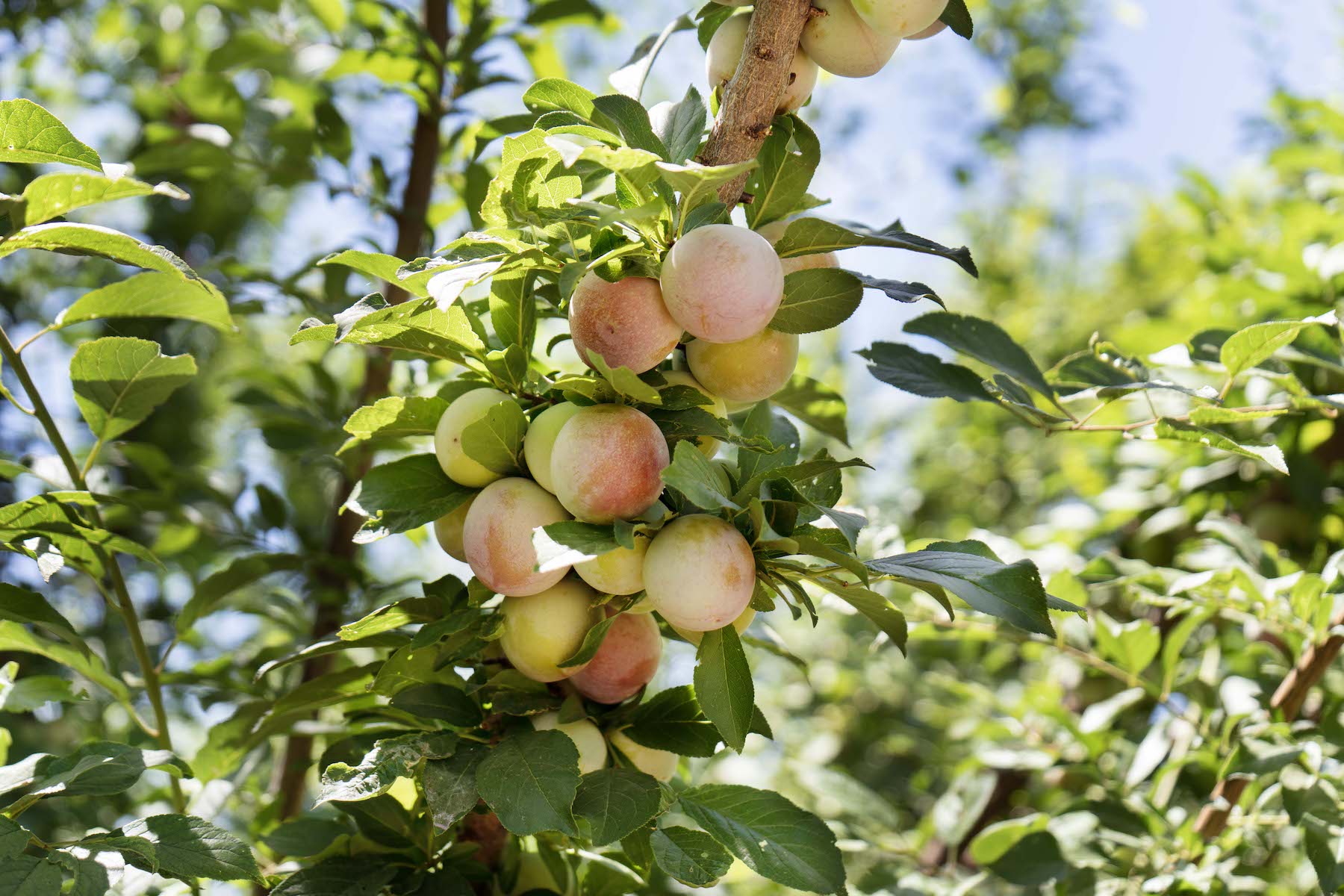
He estimates that about 10 families could live on the property and live completely off the food that is produced on its 10 acres without the need for any external produce, apart from chocolate and coffee, perhaps.
“I’d like to leave my children with a 10-acre fully sustainable off-the-grid farm that they can use and enjoy for generations to come,” he said.
Now halfway through a 10-year plan, the Arizona Worm Farm is about 35-40% to its goal of completely sustainable farming and living. Though they’re waiting on industrial changes, such as electric floaters and tractors, a full fleet of electric vehicles, and a more viable alternative to plastic, Brooks is optimistic it will all come together. He also wants to work with suppliers who use compostable packaging and to add more solar applications.
“Ideally, we will reach a point where we have no fossil fuels and no plastic and [be] truly zero waste,” he said. “We will then just continue to operate the farm in perpetuity, with sunshine, rainwater, and other people’s garbage.”
PAY IT FORWARD
The Arizona Worm Farm shares its knowledge with fellow Southwest gardeners, too. From beginning gardeners and fruit tree growers to aspiring vermicomposters, a team of Arizona gardeners and vermicomposting experts teach classes and are happy to help educate curious eco-nerds on waste reduction techniques, carbon capture in soil, and regenerative agriculture. For beginners, their classes focus on how to reduce the cost of gardening, how not to use commercial fertilizers, how to save seeds, and more. Classes often sell out months in advance, Brooks said.
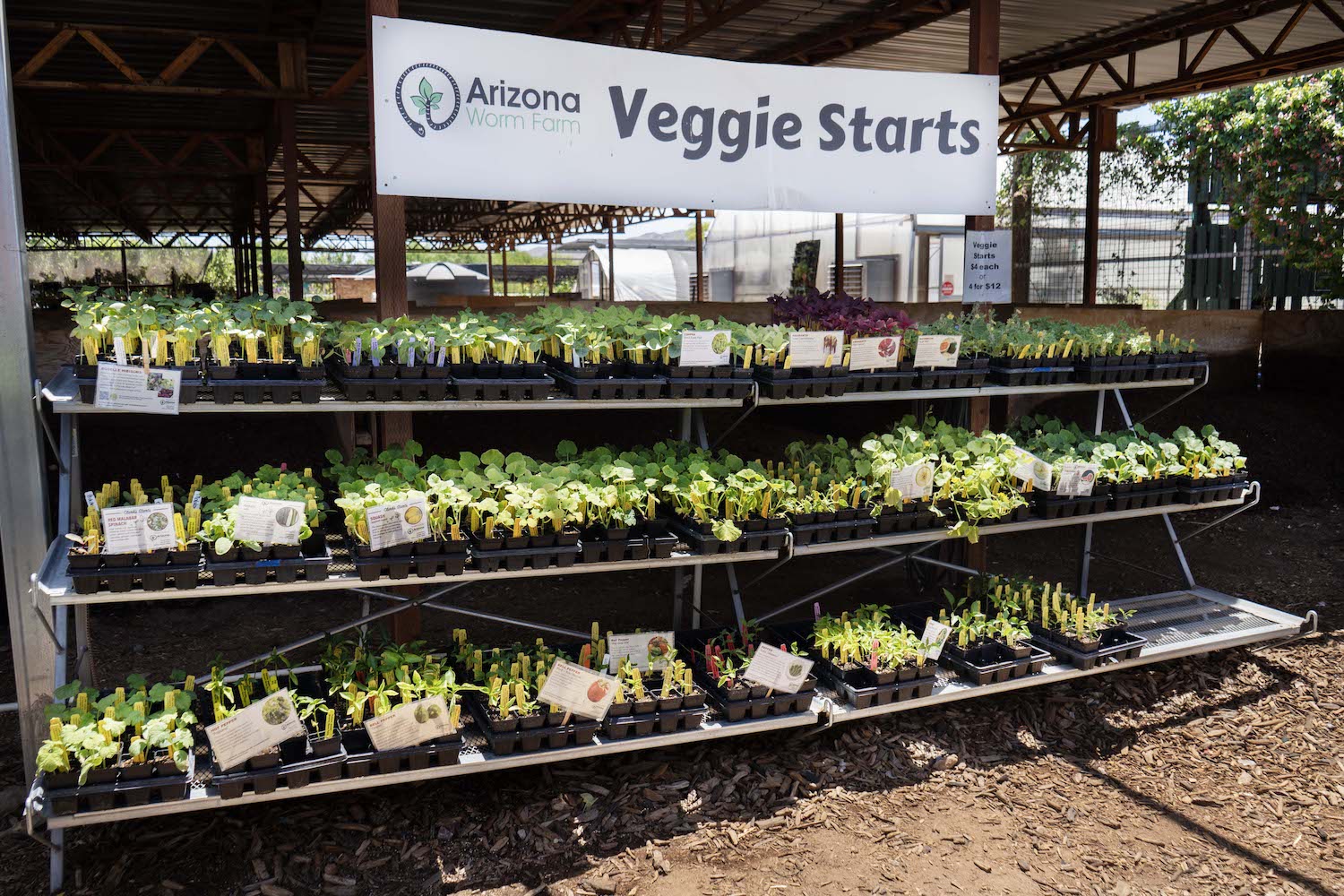
“We want to change the paradigm on waste and food growing. We’d like to show people how to do what we’re doing, which is to say, turn your garbage into food,” Brooks notes. “The truth is that a tomato that you pick from your backyard just really tastes significantly better than the one that you buy that was picked in Florida six weeks before it got to your table.”
Visitors are welcome at the farm during open hours and can take a self-guided tour or a private tour by a farm employee. The store features goods directly from the farm, including worms, castings, compost, mulch, raised bed mix, vermicomposted tea, veggie transplants, and freshly harvested vegetables.
The farm is located at 8430 S. 19th Ave. Hours are 8 a.m. to 4 p.m. Monday through Friday, 8 a.m. to 1 p.m. on Saturdays, and closed on Sundays.
Read more Good articles from Green Living.
